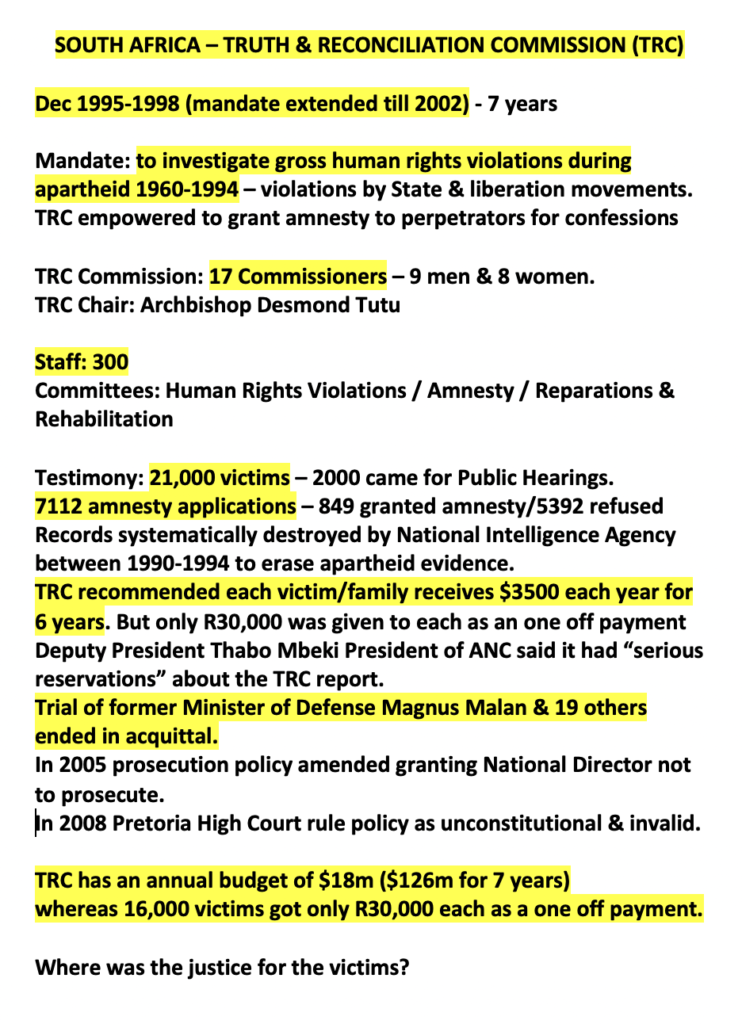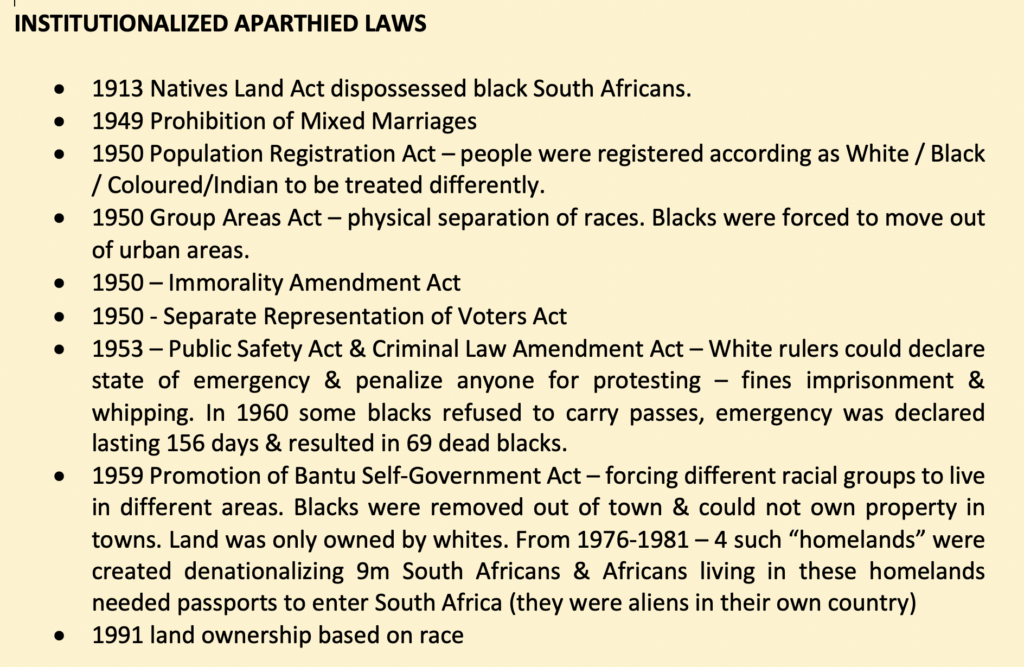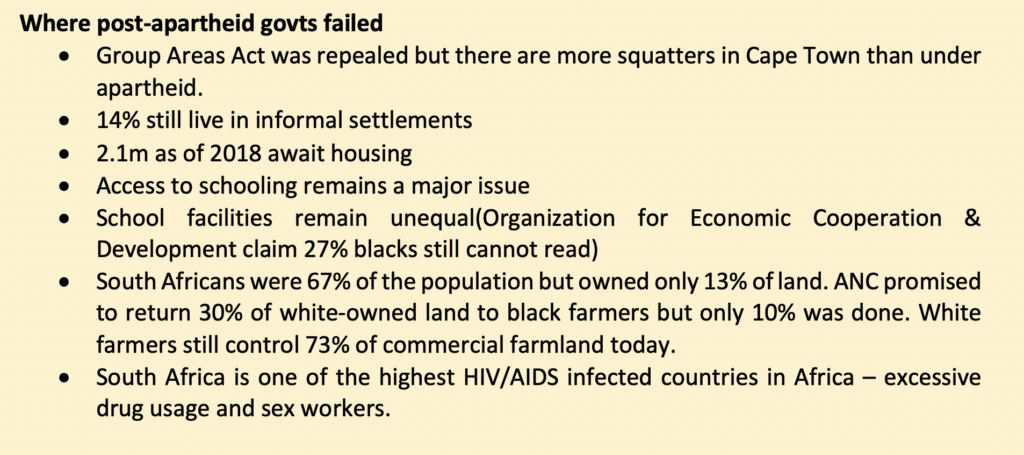by Shenali Waduge · Published 26th March 2023

Sri Lanka’s politicians may enjoy jaunts overseas but they must be sensible to not agree to every foolhardy suggestion that comes their way. We have had a string of foreign ministers nod their heads to proposals that have nothing to do with Sri Lanka’s plight and contributing to creating more cocktails. LTTE terrorism ended in 2009 but separatism didn’t. It is now 2023 and we have been living without any of the lovey-dovey solutions by the UN apparatus who has yet to stop the separatism quest. However, in 2019 another form of terror arose with Islamic suicide terrorism & Minister Sabry is advised to look into this without digging up what should remain buried for good. While he should spend more time stopping separatist quests in Sri Lanka.
South Africa experienced apartheid laws in 1948 (the year Sri Lanka gained independence)
These laws separated people as blacks & whites. They had to live separately & develop separately. Inter-marriage & social integration was disallowed (this ties well with Wigneswaran’s policy) Whites were barred from having any relationship or even friendship with blacks & vice versa. Jobs were given to whites & blacks separately. In their own land, the majority blacks were made an inferior race by law. Policy of segregation in South Africa did not exist in Sri Lanka except what Tamil leaders aspire to achieve.
What South & Sri Lanka do have in common
Colonized by the British & Dutch
Dutch East India Company arrived in 1652 (Dutch settlers became known as Afrikaners/Boers)
The British seized Cape of Good Hope from the Dutch during Napoleonic wars in 1805. Dutch & British fought for supremacy due to the discovery of diamonds – resulting British setting up concentration camps for Boers.
Rampant corruption (World Bank declared South Africa to be the most corrupt country in the world in 2018)
We complain about Sri Lanka’s politicians, but Jacob Zuma prosecuted for rape in 2006 won the Presidency in 2009. His tenure ended in 2017 after corruption & capitulation to wealthy Guptas emerged (Indian influence in politics)

The African National Congress formed in 1912 after South Africa was created, was formed for the Black educated elite. This mirrored the political framework existing in Sri Lanka where colonials aligned with only English educated Christian converted locals. However, ANC shifted policy to go against apartheid & commenced a Defiance Campaign in 1952. Blacks were called to break apartheid laws & get into “white buses” use “white toilets” & enter “white areas” – another area that Sri Lanka has no comparison with South Africa. 8000 Blacks ended up in jail. ANC broke into PAC which took a more militant path – this may be compared to the TULF calling for youth to take up arms & Tamil youth doing so.
In 1990 Nelson Mandela was freed, ban on ANC was lifted & a new constitution emerged with first democratic elections in 1994 (Sri Lanka’s was in 1947) Mandela became first Black President. Yet, from 1994-2023 South Africa is still living in poverty, inequality, facing health & corruption issues & remains a violent society.
Current President Ramposha has failed to put into practice the “reconciliation” efforts he was promoting before becoming President. The same President in 2012 who was a wealthy businessmen ordered police action against strikers – the police ended up killing 34 striking miners on that order.

The neo-liberal aspect of South Africa’s Truth & Reconciliation Commission is identical to the present Truth Commission, Sri Lanka’s foreign minister is trying to promote.
South Africa’s ANC abounds in scandals & corruptions essential ingredients favoring neo-liberal agendas to denationalize citizens at social, political & economic levels. In this sense, Sri Lanka has similarities. If Africa’s TRC has brought about structural collapses, why is Sri Lanka following the same path of destruction or is this the goal?
“Human Rights” slogans are part of the neo-liberal framework and used as consort to exert pressures on developing nations at civil & political levels though ignoring inequalities in society. International bodies such as UN/WB/IMF spend more time parroting human rights than they do to erase inequalities.
What exactly is a Truth Commission expected to do?
In South Africa’s context it was to look at human rights abuses during apartheid, share the traumas & then unite in healing. Basically, it was to take the incidents, cry over what happened & just move on because there was little retributive justice, in fact there was hardly any justice.
Where neoliberalism is connected to South Africa’s TRC is the manner that the whites held power over South Africa’s economy (in many ways no different to how minorities control Sri Lanka’s economy) South Africa under apartheid where whites ruled blacks using blacks as labor has changed little in post-apartheid.
The TRC allowed blanket amnesty simply for confessions. The hearings resulted in individuals being coerced into giving “truths” that fitted a “shared narrative” & peddled as national healing. It was a memory that was far from the truth but people were made to believe it was part of what should be remembered/their memory. Classic case of Christian “forgive & forget but take revenge”. How unfair to erase the traumas people suffered around a lie that suited the choreographers who were preparing the narrative. This is why Sri Lanka is being warned & questions on what grounds Sri Lanka’s foreign minister is pursuing this bogus TRC tying up with South Africa.
Individual acts of violence was constituted as group killings or torture & this aspect should be of particular concern in the light of falsified & dramatized allegations being cooked up against Sri Lanka’s armed forces to collectively declare them war criminals. Where Geneva has failed to do, Sabry is taking Sri Lanka into a trap that aims to do the same. The TRC did not treat institutionalized racism which 32m people suffered. TRC even excluded loss of homes to 3.5m people through forced removals. The “neutral” position taken by the TRC meant that it looked at abuses even – with more emphasis on reactions rather than the action.
“Victim status” depended on the offence meeting the political objective – if not victim statements were turned down.
Desmond Tutu bewailed the “ungenerous reparations” to victims of apartheid who appeared at TRC. TRC final report recognized 22,000 victims of apartheid human rights violations. TRC recommended R126,000 reparations over 6 years which Mbeiki reduced to an one-off payment of R30,000 each. Less than 16,000 received this.
Coincidentally, South Africa’s TRC Commissioner was Yasmin Sooka, whose EU funded NGO meant to look into South Africans ended up plugging an anti-Sri Lanka unit into the NGO & going on a witch hunt against Sri Lanka & its armed forces.
In 2020 after 17 years of silence ANC spoke. President Ramposha has failed to respond to letters written by victims’ families re prosecution of TRC cases. South Africa’s TRC has politicized reconciliation. This is exactly what is being imported to Sri Lanka. Without addressing the root causes -the narrative was taken on a different course completely changing the entire systematic racism that prevailed.
If the objective is restorative justice – there is no requirement for any tribunals or commissions. People are simply going on with their lives. What is the point in a commission that is created for a political objective & politically motivated crimes/abuses as in the case of South Africa to be duplicated in Sri Lanka. People in AC rooms and from remote offices see incidents differently to those in the thick of things & they cannot dictate how the traumatized should feel & act. South Africa’s TRC failed to identify racism as the root of apartheid & it downplayed white supremacy. The same players are trying to down play the separatist-terrorism by peddling the creation of mono-ethnic devolution via 13a as it fits a larger geopolitical agenda.
Shenali D Waduge
